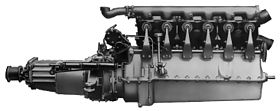This article needs additional citations for verification. (June 2012) |
The Lanchester Thirty-Eight was manufactured from 1910 to 1914 by the Lanchester Motor Company, located in Birmingham, England.[2]
| Lanchester Thirty-Eight | |
|---|---|
 Rotund phaeton[note 1] 1912 example | |
| Overview | |
| Manufacturer | The Lanchester Motor Company Limited |
| Production | 1910–1914 |
| Assembly | Sparkbrook, Birmingham |
| Designer | George Lanchester[1] |
| Body and chassis | |
| Class | luxury carriage |
| Body style | Tourer |
| Layout | FR layout (engine between driver and front seat passenger)[1] |
| Powertrain | |
| Engine | 4.856 L I6 Straight-six[1] |
| Transmission | Lanchester patent compound epicyclic, 3-speeds and reverse, with separate high pressure lubricating system Clutch-Lanchester multi-disc for direct drive[1] |
| Dimensions | |
| Wheelbase | 127.0 in (3,226 mm) (SWB) 139.0 in (3,531 mm) (LWB)[1] Track = 58.0 in (1,473 mm)[1] |
| Kerb weight | 35 long cwt (3,920 lb; 1,780 kg) (LWB with standard touring body)[1] |
| Chronology | |
| Predecessor | Twenty-Eight |
| Lanchester 38 hp | |
|---|---|
 | |
| Overview | |
| Manufacturer | The Lanchester Motor Company Limited |
| Production | 1910–1914 |
| Layout | |
| Configuration | 6-cylinder in-line |
| Displacement | 4,856 cubic centimetres (296 cu in)[1] |
| Cylinder bore | 101 mm (4.0 in)[1] |
| Piston stroke | 101 mm (4.0 in)[1] |
| Cylinder block material | 1910-1912 cylinders cast singly 1913-1914 in pairs[1] |
| Valvetrain | Overhead, horizontal, 2 per cylinder, operated by rocking levers and flat plate springs Twin camshafts in upper half of crankcase[1] |
| Combustion | |
| Fuel system | Lanchester patent wick fuel vapouriser H.T. magneto and Bosch trembler coil for starting[1] |
| Fuel type | Petrol |
| Cooling system | Honeycomb radiator, thermo-syphon, two fans[1] |
| Chronology | |
| Predecessor | 28 hp |
History
editIt was designed by the youngest brother, George Lanchester assisted by Frederick Lanchester acting as a consultant which was a reversal of their previous roles. By the end of 1913 Frederick Lanchester would cease to have any connection with the company at all.
However as the 38 hp was a development of the preceding 28 hp which was designed by Frederick this car may be said to have more of Fred than of George in it.[1]
References
editNotes
edit- ^ Rotund phaeton - an English modification of the popular 'Roi des Belges' style, less voluptuously curved, lighter and easier to clean.
Page 115, Anthony Bird & Francis Hutton-Stott, Lanchester Motorcars, A History, Cassell, London 1965
External links
editWikimedia Commons has media related to Lanchester 38 hp.